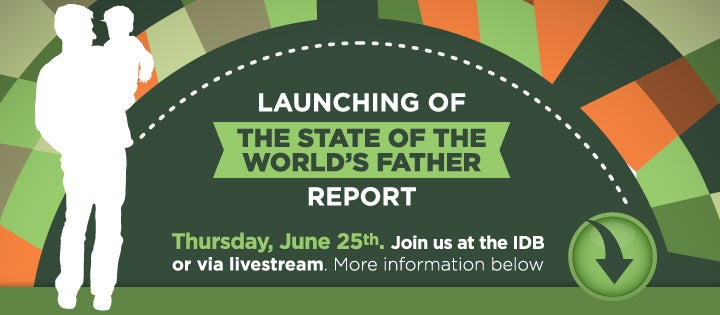Para leer en español, haz click aquí
By Gary Barker*
Fathers matter. Around 80% of men will become fathers at some point in their lives, and virtually all men have some connection to children. Father-child relationships have profound and wide-ranging impacts on children that last a lifetime. Furthermore, men’s participation as fathers and as caregivers matters tremendously for women’s lives and positively affects the lives of men themselves.
Watch the video of the launching event at the IDB
[vsw id=”6sHhb7ObqMA” source=”youtube” width=”425″ height=”240″ autoplay=”no”]
As much of the world turns to celebrate the role of fathers this month, the first-ever State of the World’s Fathers report reveals long-lasting disparities, drawing on evidence from hundreds of studies covering all countries in the world with available data. And these are some of the key findings:
- In no country in the world do men and boys share unpaid domestic and care work equally with women and girls.
- Women spend more time on combined paid and unpaid work than men do.
- The largest disparities are in Latin America, where women spend six to 23 more hours per week than men do on paid and unpaid work.
The double burden carried by many women reduces their ability to contribute to the household economy, as well as to develop their own skills and talents outside the home. In a study in Latin America and the Caribbean, more than 50% of women aged 20 to 24 said that their unpaid responsibilities at home were the main reason they could not look for paid work.
Paternity leave as a way towards equality
This imbalance has widespread negative effects. It hurts men, women, and children. Women lose opportunities for work and income, and girls are often held back from educational opportunities, which exacerbates gender inequality and gendered poverty. Boys and girls lose out on the benefits of having an involved father, and men miss out on the connections and closeness that fatherhood can offer. Even economies suffer: the monetary value of unpaid care work has been estimated at between 10% and 39% of the GDP.
To achieve women’s economic empowerment, and gender equality more broadly, it is essential that men take on 50% of the caregiving and domestic work. However, this change cannot happen in isolation, policies and programs must also be in place to support it. Chelsea Clinton, at the report’s global launch at the UN headquarters commented, “one of those policies and practices that this report advocates for, and I could not agree with more strongly, is having more paid paternity leave.”
Well designed leave policies for fathers have the potential to transform gender relations at home, at work, and in society at large. Indeed, no other policy change has proven as effective as paid, non-transferable leave for fathers in terms of increasing men’s participation in caregiving.
However, while paid maternity leave is now offered in nearly all countries, only 92 countries offer leave for fathers and, for half of these, the leave is less than three weeks. In Latin America and the Caribbean, fewer than 40% of the countries offer paternity leave, with none providing more than 16 days. If we want to see a world where men and women are equal economically, socially and politically, they must also have equal opportunities to care.
It is time for fatherhood and men’s caregiving to enter the global agenda for gender equality: for the benefit of women, men and children. It is time to invest in involved, non-violent fatherhood year-round.
 *Gary Barker, PhD, is International Director and founder of Promundo, an international NGO that works to promote gender justice. He is also coordinator of the multi-country survey on men IMAGES, and co-founder of MenCare, a global campaign to promote men’s involvement as equitable, non-violent caregivers.
*Gary Barker, PhD, is International Director and founder of Promundo, an international NGO that works to promote gender justice. He is also coordinator of the multi-country survey on men IMAGES, and co-founder of MenCare, a global campaign to promote men’s involvement as equitable, non-violent caregivers.


Leave a Reply